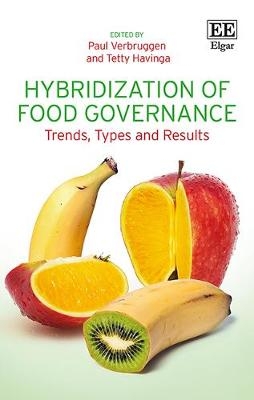
Hybridization of Food Governance
Edward Elgar Publishing Ltd (Verlag)
978-1-78536-169-2 (ISBN)
Modern food governance is increasingly hybrid, involving not only government, but also industry and civil society actors. This book deftly analyzes the unfolding interplay between public and private actors in global and local food governance.
Split into three parts, chapters focus on the legitimacy and integrity of private food governance, the hybridization of EU Food Law and hybridization in transnational food governance. Within these key areas, food scholars from diverse disciplinary fields present a fascinating array of original empirical case studies, showing hybrid governance arrangements in China, Europe and North America. Through these practical examples, they consider in detail how the responsibilities and risks inherent in these arrangements are allocated, how their legitimacy is ensured and the effect that they have on industry and government practice.
Timely and discerning, this book will appeal to legal students and scholars focusing on regulation and governance and, in particular, those considering its relation to food. It will also provide guidance to policymakers on how to shape and direct the trends, types and outcomes of hybrid food governance.
Contributors include: D. Casey, E. Fagotto, M. Faure, A. Fearne, M. Garcia, T. Havinga, M. Hussein, A. Kalfagianni, K. Kindji, K. Kirezieva, K. Kottenstede, P. Luning, T.D. Lytton, L.K. McAllister, T.A. Roche, E. Thomann, B.M.J. van der Meulen, P. Verbruggen
Edited by Paul Verbruggen, Assistant Professor of Global and Comparative Private Law, Tilburg Institute for Private Law, Tilburg University and Tetty Havinga, formerly Associate Professor in Sociology of Law, Faculty of Law, Radboud University, the Netherlands
Contents:
1. Hybridization of food governance: an analytical framework
Paul Verbruggen and Tetty Havinga
PART I legitimacy and integrity of private food governance
2. Structuring private food governance: GLOBALGAP and the legitimating role of the state and rule intermediaries
Donal Casey
3. Resolving gaps in third-party certification for food safety hybridization
Elena Fagotto
4. Oversight of private food safety auditing in the United States: A hybrid approach to auditor conflict of interest
Timothy D. Lytton and Lesley K. McAllister
5. Hybridity in action: Accountability dilemmas of public and for-profit food safety inspectors in Switzerland
Eva Thomann and Fritz Sager
PART II Hybridisation of EU Food Law
6. Responsibility in EU food law
Bernd M.J. van der Meulen
7. Management-based regulation of food safety in the United Kingdom
Mohamud Hussein, Marian Garcia Martinez and Andrew Fearne
8. The influence of context on food safety governance: Bridging the gap between policy and quality management
Klementina Kirezieva and Pieternel Luning
PART III Hybridisation in transnational food governance
9. The Global Food Safety Initiative and state actors: Paving the way for hybrid food safety governance
Tetty Havinga and Paul Verbruggen
10. Transnational private food standards in the People’s Republic: Hybridization with Chinese characteristics
Kai Kottenstede
11. Domestic responses to transnational private governance: The Marine Stewardship Council in Alaska, Australia and Ecuador
Agni Kalfagianni and Tiffany Andrade Roche
12. Overcoming food safety challenges through regulatory cooperation: Evidence from the UEMOA
Kévine Kindji and Michael Faure
Index
| Erscheinungsdatum | 03.05.2018 |
|---|---|
| Verlagsort | Cheltenham |
| Sprache | englisch |
| Maße | 156 x 234 mm |
| Themenwelt | Recht / Steuern ► EU / Internationales Recht |
| Recht / Steuern ► Öffentliches Recht ► Umweltrecht | |
| Recht / Steuern ► Privatrecht / Bürgerliches Recht ► Medizinrecht | |
| Sozialwissenschaften | |
| Technik ► Lebensmitteltechnologie | |
| ISBN-10 | 1-78536-169-4 / 1785361694 |
| ISBN-13 | 978-1-78536-169-2 / 9781785361692 |
| Zustand | Neuware |
| Haben Sie eine Frage zum Produkt? |
aus dem Bereich


